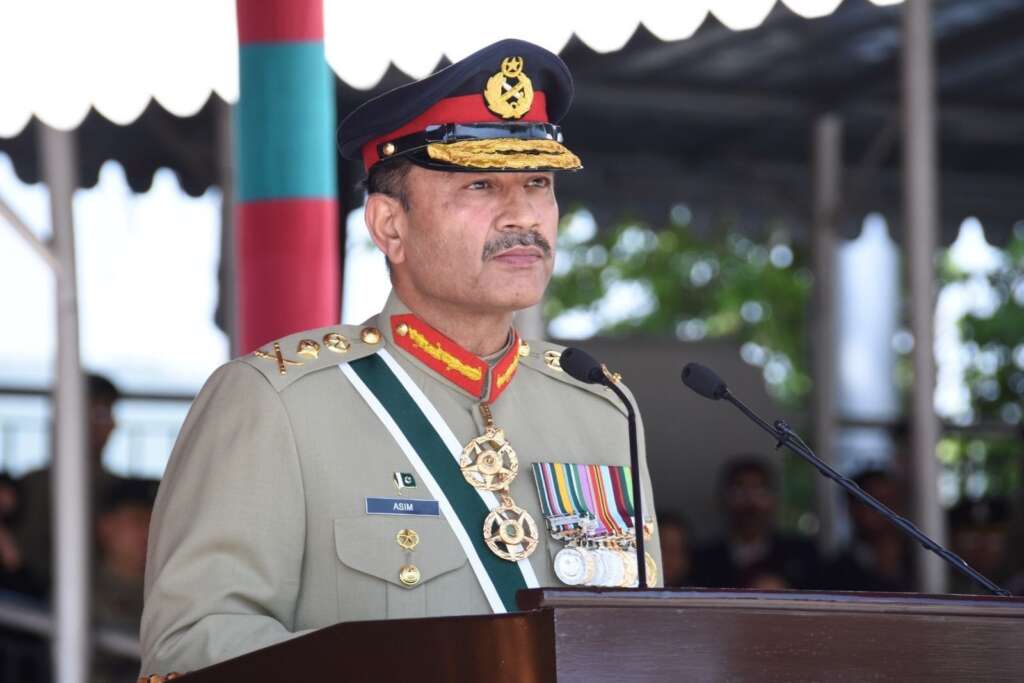In a historic week, Pakistan’s government made significant legislative amendments to the Pakistan Army Act and judiciary while addressing global peacekeeping challenges at the International Association of Peacekeeping Training Centre (IAPTC) conference. These developments mark pivotal strides for political stability, judicial efficiency, and Pakistan’s commitment to international peace efforts.
Army Chief Tenure Extended
On November 4, Pakistan’s parliament passed a landmark amendment to the Pakistan Army Act of 1952, extending the tenure of military leaders, including Army Chief General Asim Munir, from three years to five. This change, introduced by Defence Minister Khawaja Muhammad Asif, was quickly approved by both the National Assembly and the Senate in an intense session. The amendment removes the retirement age cap for four-star generals, allowing them to serve beyond the previous 64-year limit.
The government of Prime Minister Shehbaz Sharif, leading a coalition opposed to ex-Prime Minister Imran Khan, appears to be solidifying support among influential military leaders through these amendments. Information Minister Attaullah Tarar expressed that the extension aims to promote continuity within military leadership and ensure stability for institutional policies, aligning the tenure with other national positions that hold five-year terms. With this change, General Munir’s term now extends to 2027.
However, the bill’s swift passage sparked objections from Khan’s party members, who labeled it as rushed legislation, lacking necessary debate. Omar Ayub, a prominent figure from Khan’s Pakistan Tehreek-e-Insaf (PTI), criticized the move, voicing concerns that it undermines military and national interests. Still, key political allies, including the Pakistan Peoples Party Parliamentarian (PPPP) and Awami National Party (ANP), backed the bill, underscoring the broader support within the ruling coalition.

Judicial Reforms to Improve Efficiency
Alongside the military reforms, Pakistan’s parliament passed crucial legislation to improve judicial capacity and efficiency. Changes to the Supreme Court (Practice and Procedure) Act of 2023 and the Supreme Court (Number of Judges) Act of 1997 are set to increase the number of judges on Pakistan’s Supreme Court from nine to twelve and expand the Islamabad High Court’s bench, addressing rising caseloads.
The amendments will bolster judicial efficiency, particularly in Islamabad, where rising litigation demands an expanded judiciary to ensure timely case resolutions. The new Supreme Court act also formalizes a committee to oversee case allocations, comprising the Chief Justice and the most senior constitutional bench judges. These reforms aim to streamline judicial processes and improve access to justice.
Global Peace Commitment at IAPTC
Amid these significant legislative changes, Pakistan demonstrated its dedication to global peace and security by hosting the 28th Annual Conference of the International Association of Peacekeeping Training Centre (IAPTC) at the National University of Sciences and Technology (NUST) in Islamabad. This marked the first time Pakistan hosted the IAPTC, underscoring its active role in peacekeeping.
During his address, COAS General Syed Asim Munir highlighted the ongoing global peace challenges, drawing attention to the humanitarian crises faced by Palestinians and Kashmiris in Indian Illegally Occupied Jammu & Kashmir (IIOJK). He emphasized that despite numerous peacekeeping efforts by the United Nations, the plight of innocent Kashmiris and Palestinians reminds the world of the work still needed to achieve global stability.
Jean Pierre Lacroix, the United Nations Under-Secretary-General for Peace Operations, commended Pakistan’s contributions to UN peacekeeping, acknowledging the dedication and sacrifice of Pakistani personnel in international missions.


